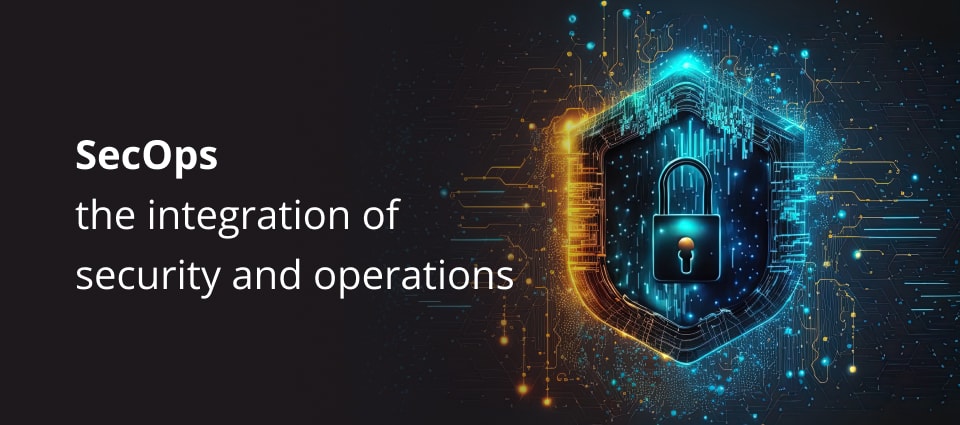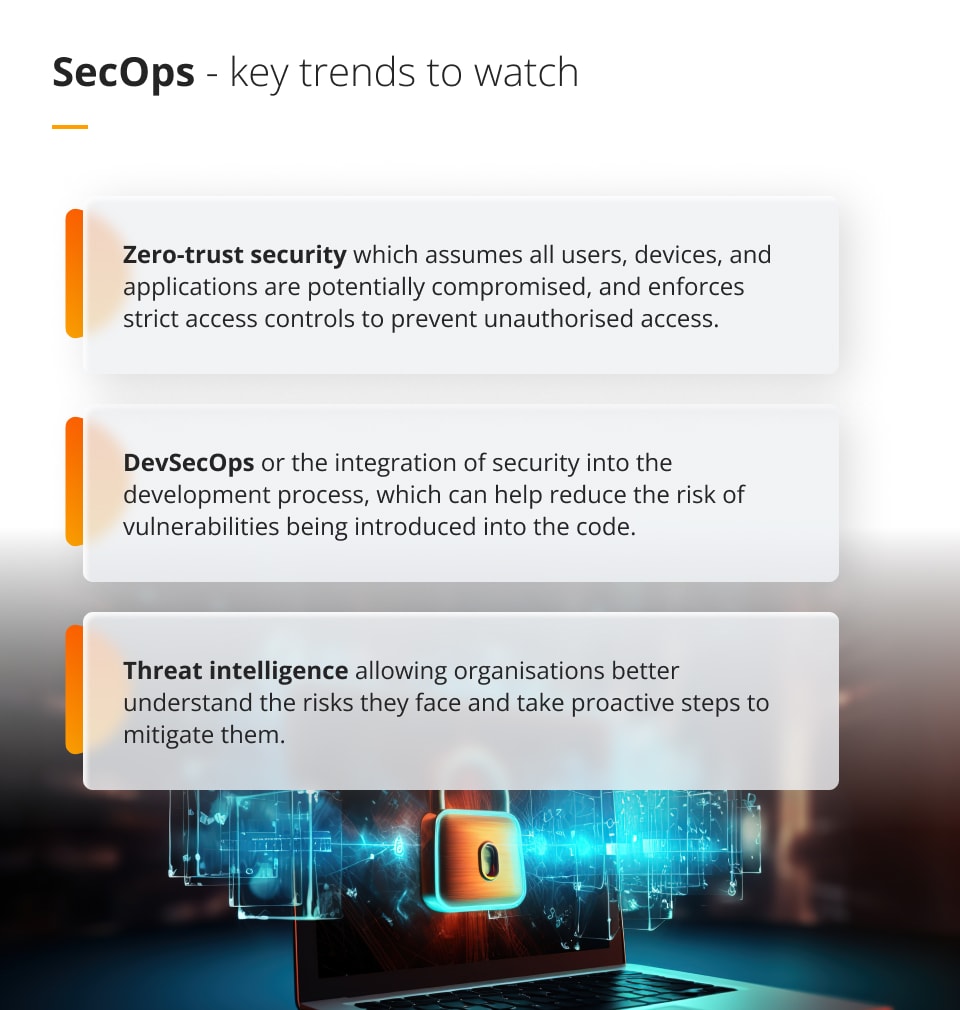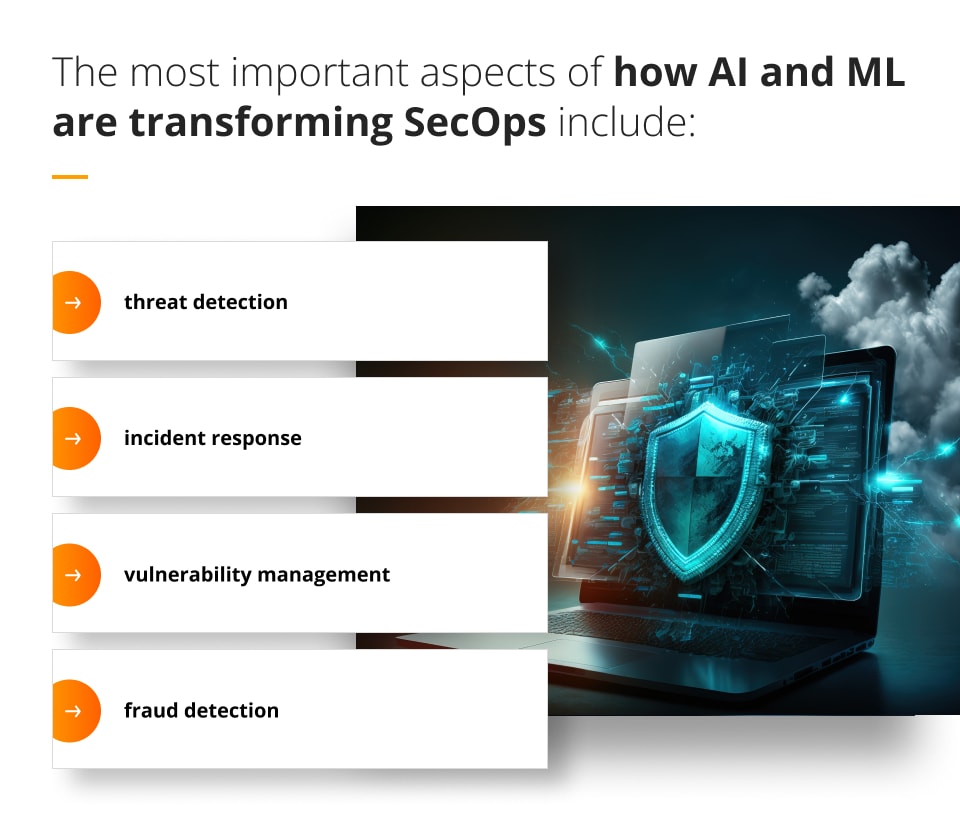
The future of security operations (SecOps): trends and disruptions
SecOps is currently one of the most fundamental parts of businesses' security activities. Today we look closer at its challenges, main opportunities it presents and key trends to keep an eye on.
SecOps now: challenges, opportunities, and key trends to watch
SecOps, meaning the integration of security and operations, is today more important than ever before. With the always growing number of cyber threats and new attacks, all organisations understand the importance of a holistic approach to security, which SecOps is all about.
Thanks to SecOps organisations improve collaboration between their security and operations teams, enhancing their overall security posture and reducing the risk of cyber attacks.
It’s exactly this lack of collaboration between security and operations teams – which often work in silos, leading to communication breakdowns and delays when it comes to responding to security incidents – that was the main motivation for the emergence of SecOps.
Yet it does not come without challenges, the most important ones being the complexity of technology – with multiple systems and applications to manage it may proof difficult for organisations to ensure all their security measures are working effectively – and shortage of skilled professionals, especially painful in the times when organisations struggle to find qualified employees to manage their security operations.
SecOps – key trends to watch
Some of the key trends to watch out for when it comes to SecOps include:
The importance of organisation’s security posture: threat intelligence
Organisations’ security posture refers to their overall approach to security and their ability to detect and respond to threats.
Threat intelligence is its critical component, as it provides valuable insights into the latest cyber threats and attacks.
Threat intelligence involves gathering and analysing data from a range of sources, including open source intelligence or social media. This data is then used to identify emerging threats, patterns of activity, and potential vulnerabilities that could be exploited by cybercriminals.
By leveraging threat intelligence, organisations take proactive steps to mitigate their risk of cyber threats. They can use it to:
- strengthen their defences by updating software, implementing new security controls or investing in new technologies to improve their security posture,
- improve incident response by providing early warnings of potential threats,
- stay informed about the latest cyberthreats and trends, allowing to take proactive steps to protect themselves against emerging threats.
AI and Machine Learning transforming SecOps: the power of automation
Security operations is today highly influenced by the increasing adoption of artificial intelligence (AI) and machine learning (ML). The power of automation provided by these technologies enables organisations to detect and respond to security threats in a faster and more efficient manner than ever before.
The most important aspects of how AI and ML are transforming SecOps include:
- threat detection done by AI and ML algorithms which analyse large volumes of security data in real time, identifying patterns of behaviour that indicate a potential security threat,
- incident response where AI and ML can automatically trigger pre-defined responses,
- vulnerability management done by analysing data from a range of sources such as internal logs and external threat intelligence feeds,
- fraud detection, including credit card fraud and identity theft, done by analysing data from multiple sources in real time.
Best practices for building security operations teams
Building a strong security operations team is essential for maintaining an effective security posture and protecting an organisation from cyberthreats.
Here are some best practices worth focusing on when building a security operations team:
- clearly define roles and responsibilities,
- hire skilled professionals with a solid understanding of security principles, similar working experience and strong problem solving skills,
- foster collaboration between team members and between different departments across your organisation,
- invest in ongoing training and development opportunities that will allow your employees stay up-to-date with the latest security trends and technologies,
- implement processes and procedures for incident response, vulnerability management and other security operations tasks,
- leverage technology to automate security operations tasks wherever possible,
- foster a culture of security to make everyone within the organisation aware of their role in maintaining a strong security posture.
Challenges and strategies for SecOps in the cloud era: best practices for security
The recent global move to the cloud has brought organisations many benefits, including increased flexibility, scalability and cost savings. But it also created some challenges – here are some of the most important ones:
- lack of visibility of cloud environment due to its high dynamics,
- complexity of cloud environment which may mean challenges in effective management of SecOps,
- shared responsibilities between the cloud service provider and the customer, which may make it difficult for SecOps teams to understand where their responsibilities begin and where they end.
Some of the strategies used to deal with those challenges are:
- implementing security best practices,
- leveraging automation which help streamline SecOps tasks and improve efficiency,
- implementing cloud native security controls to maintain visibility and control over the cloud environment,
- monitoring for anomalies by implementing an effective security information and event management solution (SIEM),
- implementing a DevSecOps approach where security is integrated throughout the entire software development lifecycle.
Find out more in Adam Gaca’s article: The complete guide to cloud security management.
Keen to stay up-to-date with new security trends and technologies?
At Future Processing we offer highly specialised cybersecurity consulting services that helped many of our clients in maintaining a strong security posture and staying ahead of cyber threats. Get in touch with us today to discuss details.







